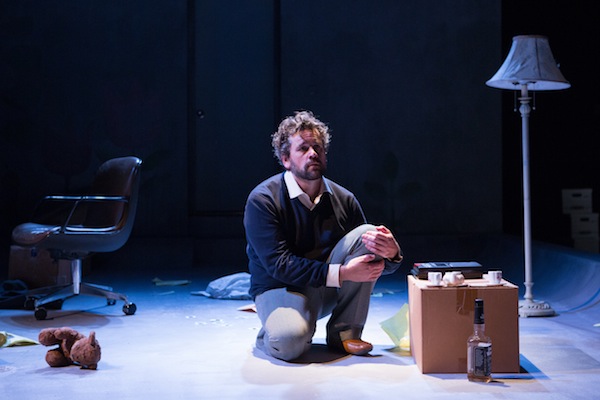UrbanArias’ “Lucy” presents an intriguing, disturbing new opera

Andrew Wilkowske in John Glover’s “Lucy,” presented by UrbanArias at the Atlas Performing Arts Center. Photo: Teresa Wood
Only in the 1960s would having a psychotherapist and his family raise a chimpanzee from birth as their daughter have seemed not only reasonable but worthwhile. Maurice Temerlin, a professor at the University of Oklahoma, did just that with a chimp named Lucy starting in 1964, part of a series of “cross-fostering” attempts. The results, detailed in Temerlin’s book about the 11-year experiment, are disturbing on multiple levels. A new opera by Brooklyn-based composer John Glover explores only some of them, heard on Friday evening from UrbanArias at the Atlas Performing Arts Center.
Lucy, premiered in 2014 at Milwaukee Opera Theater, is a sort of staged song cycle for one singer. Baritone Andrew Wilkowske, who premiered the work and recorded it for New Focus Recordings, inhabited the role of the disturbed Temerlin with uncanny directness. Bursting through a door carrying a half-empty bourbon bottle, Wilkowske delved into deep psychological waters as the character, learning of the death of his “daughter” at a wildlife refuge in The Gambia, is flooded with memories of their life together.
To no one’s surprise but Temerlin’s, the experiment had disastrous results for both the family and the chimpanzee. Wilkowske brought a broad, crooning tone to the song about Lucy’s less than ideal defecation habits (“I prefer an organized world in which feces are deposited in the proper place”), set by Glover as a parody of a Viennese operetta ballad. The central song (“Lucy, in her natural setting, is a sight of great beauty”) was a moment of beautiful nostalgia, with flowing triplets in the orchestra, music that returns at the end of the work. Wilkowske displayed a broad range of vocal characteristics, from a stentorian low range into a disembodied falsetto, even devolving into rhythmic speaking and shouted Tarzan shrieks.
Glover has created an unusual and often beautiful sound world with a chamber ensemble accompanying Wilkowske. In particular, the toy piano, played elegantly by David Hanlon, added a creepy dimension to this disturbing “childhood” fantasy. (Glover’s repertoire includes an evening-length work for toy pianist Phyllis Chen, accompanied by film and puppetry.) The instrument, shadowed only by fragile violin and cello harmonics (played by Sandy Choi and Hrant Parsamian, respectively), is put to memorable use here as the principal voice in an unexpected and tender aria “sung” by Wilkowske using no sound, just gestures forming some of the 140 sign language words Lucy learned.
If anything, the libretto by Kelley Rourke, dramaturg at Washington National Opera, soft-pedals the scandalous details of the story. Temerlin’s sharing of alcohol with Lucy is treated humorously (“Lucy is an ideal drinking companion”), and there is no mention of the quasi-sexual encounters with the chimp that Temerlin documents, with no apparent shame, in his book. He eventually left the University of Oklahoma to enter into private practice.
UrbanArias founder Robert Wood capably coordinated the small instrumental ensemble, including Evan Ross Solomon on bass clarinet and R. Timothy McReynolds on piano. The songs were linked together by audio clips, presented as cassette-recorded clinical notes on the experiment. The simple production directed by Erik Pearson was effective, taking place in the special room for Lucy in the Temerlin house (set and costume design by Michael Locher) filled with many signs of human childhood — a small bed, a teddy bear seated on a small chair, a miniature tea set — reminders of the boundary crossed by the chimp into a human family.
Lucy will be repeated 8 p.m. Saturday at the Atlas Performing Arts Center. urbanarias.org; 202-399-7993.






